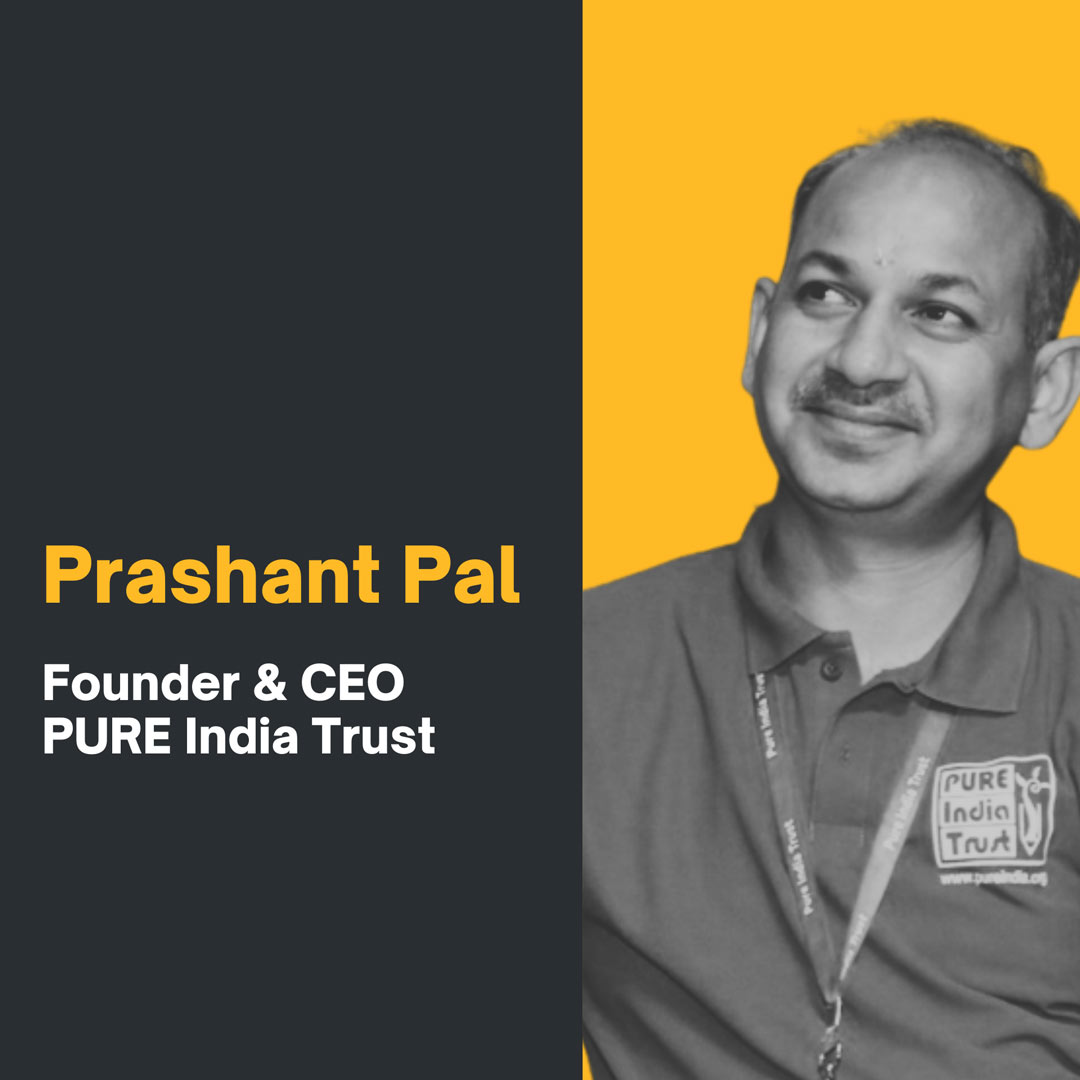CATEGORIES
People We Admire | Social Impact | Women EmpowermentOverview:
- Prashant shares his journey from living a corporate life to following his passion and giving back to society.
- Establishing Pure India Trust as an NGO and where it stands for purpose, value, expertise, and vision.
- He shares the importance of today’s youth and why their insight and contributions are imperative for developing a more sustainable environment for society.
- Prashant believes in providing technical education and promoting entrepreneurship with the primary motive of bridging the gap between the ones who are in the vicinity of such opportunities and those who may be less.
1. Sustainability is the need of the hour today. How does PURE India Trust ensure its projects’ sustainability and long-term impacts?
Sustainability is a fundamental aspect of all our endeavors at PURE India Trust. Initially born from my passion for community service, the period from 2013 to 2017 saw numerous supportive activities like medical camps and awareness programs for women in rural areas. However, I soon realized that these efforts might not have the lasting impact we had hoped for.
This realization led us to adopt a ‘Project Based Modeling’ approach, centered around the Women Entrepreneurship program. This flexible model empowers women from underprivileged backgrounds in slum areas to identify their opportunities and create prosperous livelihoods. With a 98% success rate, creating a sustainable business model has become our top priority for this venture.
Moreover, as we visit schools, we provide students with career guidance, scholarships based on their abilities, continuous mentorship, and foster a supportive ecosystem. Our commitment to sustainability extends to every project we undertake, ensuring complete ownership of rural development initiatives, and making it an indispensable prerequisite under any circumstance.
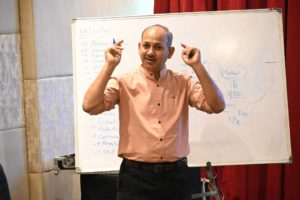
2. What advice would you give to individuals who aspire to make a difference in women’s empowerment initiatives?
The plus to this is that in speaking to students and adults alike, women empowerment is a subject everyone picks as their first choice. The growing consensus is that it is essential. Equally important is recognizing the necessity for support from the women themselves. To provide effective assistance, it is crucial to inquire about their needs and willingness to accept help.
Understanding their requirements, interests, family backgrounds, and aspirations is key to empowering them. Empowerment should focus on listening, understanding, guiding, and fostering their unique ambitions.
3. The presence of a patriarchal society either stops working women from living a life beyond household chores or questions their career choices. How do you think women must deal with this?
The prevailing societal setup, deeply rooted in tradition, often assigns women the responsibility of managing households. Despite having unique skills and potential, many women prioritize family over personal interests. Understanding the challenges faced by women in different regions and cultures, especially in countries like India, is crucial.
When women endeavor to start their own businesses, initial support from family members may be challenging to secure, but as success becomes evident, solidarity often follows.
It is essential to recognize that gender roles should not define women’s aspirations; rather, it is their choice to prioritize their households. In cases where women excel in business, a balance is struck between partners in taking up necessary roles to care for the family’s needs when either is unavailable or lacks interest in doing so.
Empowering women means acknowledging their diverse talents and supporting them in achieving their goals, regardless of traditional roles.
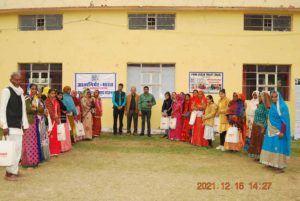
4. You’d spoken about the transitory process between working as a General Manager, then a Vice President, and eventually running a full-time NGO. We also came across an insightful book you’ve written, ‘100 Career Options’. Was there a parallel between these two passion projects?
Making the decision to shift from my role as a Quality Manager and Project Management Coach to pursuing an NGO was daunting, as it meant taking full responsibility for the outcome. Being familiar with risk management techniques, I used a portion of my savings to support my family while generating passive income by renting out a personal property.
The initial two years were financially challenging as I navigated the establishment of the NGO and securing necessary funds. This period brought some uncertainty and lack of clarity, which led to personal struggles and even extreme depression, as indicated by a psychometric test.
However, my well-calculated risks paid off, and over time, most decisions worked in favor of both the venture and my family.
Notably, the unexpected COVID-19 pandemic break proved fortunate for the project, allowing us to engage in impactful fieldwork that caught the attention of corporates, leading to additional funding opportunities.
While this shift from corporate to community-oriented work has been rewarding for me, I acknowledge that it requires careful consideration and may not be suitable for everyone.
5. What is your opinion on the current education system in India? What specific aspects would you like to see changed or improved?
After leaving my corporate job, I ventured into writing ‘100 Career Options’ as a seemingly straightforward path. Reflecting on my journey, I realized that if someone had suggested transitioning to social responsibility 17 years ago, I might have excelled even more today.
The corporate world often leaves people dissatisfied with their jobs after their 30s, with three out of four individuals feeling unfulfilled. Recognizing this, I believe that guiding students towards their interests early on, around grade 8, can lead to better-informed decisions by grade 10. Such decisions should be influenced less by external pressures and more by genuine passions.
When conducting workshops, my primary focus is to instill the idea of creating jobs rather than merely seeking one. With Pure India Trust, we aim to foster entrepreneurship within LGBTQIA+ communities, women, and the differently-abled community.
Education should start by identifying the specific fields of interest, where individuals can contribute meaningfully to society. By empowering individuals to pursue their passions, we can unleash the limitless potential of entrepreneurship and make a positive impact.
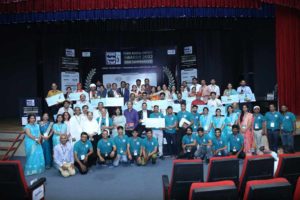
6. PURE India Trust offers internships to the youth. Could you give us an insight on this and in what capacity do college students intern/volunteer with your organization?
We have a need for content writers. A lot of our content and experiences are yet to be scribed and published. We provide opportunities for interning based on the interests of the students who approached us. An NGO isn’t simply restricted to assisting with only fieldwork. We have students work in syllabus building for our Pakshala initiative, Accounts and finance, and Digital Marketing.
The internships we provide are customizable to the interests of the people approaching us. If they display a certain level of seriousness, they are provided with access to all of our resources. Through hard work, this initiative can be a place of learning for many students and not just a medium through which one can gain a certificate of experience.
7. What were some of the hardships you faced, and how did you overcome them?
Entering the social service field can be challenging as many people may not offer encouragement, believing it to be someone else’s responsibility. As an NGO, we don’t provide consultancy services to newer NGOs seeking CSR funds; instead, we direct them to our Training & Development program, which offers both free and paid modules.
Gaining acceptance from my family was another significant hurdle. When I initially shared the idea of my venture with my brother, he advised me to think logically rather than emotionally. However, as the initiative gained traction and financial support over four years, his support grew, and he is now the main advocate for our ‘Digital Bridge‘ platform.
This experience taught me the importance of giving every decision my maximum effort, even when the odds seem stacked against it. Regardless of the outcome, putting in 100% effort is essential in pursuing one’s goals.
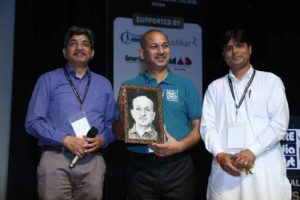
8. What are your plans for the future of PURE India Trust and yourself?
I am a person of a very volatile nature. I recently declared the role of CEO of the NGO for uptaking to my team as I want to enter into another field. My plan’s motive will nevertheless always be to help a large number of people and organizations with networking. My focus is to increase the awareness of initiatives that matter and help people leverage the advantages of cross-networking.
Secondly, I want to change the outlook that people have on NGOs. It is seen as another corrupt motive by a self-benefiting corporation. I endeavor to see NGOs get the sanctity and respect they deserve for their projects’ authenticity.
Conclusion:
Prashant Pal takes us on a learning curve of how exciting and interesting giving back to your community can get. With the advent of PURE India Trust, he shares his journey from having an extensive corporate career to running a full-time NGO. His initiatives extend into entrepreneurship promotion, women empowerment, philanthropy, passion coaching, CSR initiatives, Lean Six Sigma, and more. Every decision must encompass the larger perspective of people, profit, and purpose.

